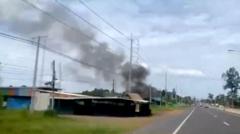Fighting erupted along the Thailand-Cambodia border in July, transforming long-standing tensions into a deadly conflict. Thai authorities report that at least 12 individuals, primarily civilians, have lost their lives in the clashes. The casualty figures on the Cambodian side remain unclear, leading to an escalating blame game between the two countries.
The origins of the discord date back over a century, following the demarcation of boundaries after the French colonial period in Cambodia. Relations officially soured in 2008 when Cambodia sought UNESCO recognition for an ancient temple in a disputed area—a move that Thailand contested vehemently. This latest outbreak of violence traces its roots back to May, following the death of a Cambodian soldier, plunging diplomatic relations to new lows.
Both nations have responded with heightened military actions, including troop deployments along the border. Following these developments, Cambodia has restricted imports from Thailand, including agricultural products and energy services.
On Thursday, conflicting accounts emerged from both sides regarding the triggers of the latest violence. According to Thailand’s National Security Council (NSC), Cambodian troops reportedly initiated the conflict with drone surveillance operations and the use of heavy weaponry, including rocket launchers. In contrast, Cambodia asserts that Thai soldiers crossed agreed-upon boundaries, provoking their military response.
The potential for a broader conflict is of concern, though leaders from both nations have indicated a preference for resolving these issues without further escalation. Thailand's acting Prime Minister, Phumtham Wechayachai, emphasizes the need for a careful approach, while Cambodian Prime Minister Hun Manet has expressed a desire for peaceful resolution, albeit with readiness to respond to aggression.
Despite the violence, travel advisories for both countries remain cautious but non-specific. The situation continues to be fluid, with travel restrictions impacting tourism in popular destinations near the border. As instability grows, the international community, including China, has urged caution for its citizens near the Thai-Cambodian frontier. Observers warn that immediate de-escalation is vital, yet the absence of resolute leadership on either side may hinder progress towards peace.



















